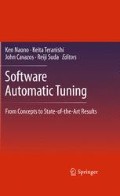Abstract
Recently, Compute Unified Device Architecture (CUDA) has enabled Graphics Processing Units (GPUs) to accelerate various applications. However, to exploit the GPU’s computing power fully, a programmer has to carefully adjust some CUDA execution parameters even for simple stencil processing kernels. Hence, this paper develops an automatic parameter tuning mechanism based on profiling to predict the optimal execution parameters. This paper first discusses the scope of the parameter exploration space determined by GPU’s architectural restrictions. To find the optimal execution parameters, performance models are created by profiling execution times of kernel using each promising parameter configuration. The execution parameters are determined by using those performance models. This paper evaluates the performance improvement due to the proposed mechanism using two benchmark programs. From the evaluation results, it is clarified that the proposed mechanism can appropriately select a suboptimal Cooperative Thread Array (CTA) configuration whose performance is comparable to the optimal one.
Access this chapter
Tax calculation will be finalised at checkout
Purchases are for personal use only
Notes
- 1.
The current SPRAT compiler does not generate a code that dynamically allocates the shared memory, and therefore the dynamically-allocated shared memory size is not considered here.
References
GPGPU.org : GPGPU General-Purpose Computation on Graphics Hardware http://gpgpu.org
NVIDIA Corporation : CUDA ZONE http://www.nvidia.com/object/cuda_home.html
NVIDIA Corporation (2008) NVIDIA CUDA Compute Unified Device Architecture programming guide version 2.0
AMD Corporation (2009) ATI STREAM ATI stream computing user guide version 1.4 beta
Papakipos M (2006) SC06 GPGPU Course: PeakStream Platform. In: the ACM/IEEE SC06 tutorial
McCool MD et al (2006) Performance Evaluation of GPUs Using the RapidMind Development Platform. In: poster reception at the ACM/IEEE SC06
Ueng SZ, Lathara M, Baghsorkhi SS, Hwu WMW (2008) CUDA-Lite: Reducing GPU Programming Complexity. In: Languages and Compilers for Parallel Computing: 21th International Workshop, LCPC 2008, Edmonton, Canada, July 31–Aug 2, 2008, Revised Selected Papers, Springer, Berlin, pp 1–15
Ryoo S, Rodrigues CI, Baghsorkhi SS, Stone SS, Kirk DB, Hwu WMW (2008) Optimization principles and application performance evaluation of a multithreaded GPU using CUDA. In: PPoPP ’08: Proceedings of the 13th ACM SIGPLAN Symposium on Principles and practice of parallel programming, ACM, New York, pp 73–82
Buck I et al (2004) Brook for GPUs: Stream Computing on Graphics Hardware. ACM Trans Graph 23(3):777–786
Han TD, Abdelrahman TS (2009) hiCUDA: a high-level directive-based language for GPU programming. In: GPGPU-2: Proceedings of 2nd Workshop on General Purpose Processing on Graphics Processing Units, ACM, New York, 52–61
Takizawa H, Sato K, Kobayashi H (2008) SPRAT: Runtime processor selection for energy-aware computing. 2008 IEEE International Conference on Cluster Computing (29 2008–Oct. 1 2008) pp 386–393
Flynn MJ (1972) Some computer organizations and their effectiveness. Comput IEEE Trans C-21(9):948–960
Lindholm E, Nickolls J, Oberman S, Montrym J (2008) NVIDIA tesla: a unified graphics and computing architecture. IEEE Micro 28:39–55
Kongetira P, Aingaran K, Olukotun K (2005) Niagara: a 32-way multithreaded Sparc processor. Micro IEEE 25(2):21–29
Cormen TH, Leiserson CE, Rivest LR, Stein C (2001) In: Introduction to algorithms, 2 edn. MIT, Cambridge, Massachusetts 02142, 762–766
Khronos OpenCL Working Group : The OpenCL Specification version 1.0 http://www.khronos.org/opencl/.
Acknowledgement
The authors would like to acknowledge support from the Tohoku University Global COE Program on World Center of Education and Research for Trans-disciplinary Flow Dynamics. This work was partially supported by Grants-in-Aid for Young Scientists(B) #21700049 and Scientific Research (B) #21300007, by NAKAYAMA HAYAO Foundation for Science & Technology and Culture, and by JST, CREST.
Author information
Authors and Affiliations
Corresponding author
Editor information
Editors and Affiliations
Rights and permissions
Copyright information
© 2011 Springer New York
About this chapter
Cite this chapter
Sato, K., Takizawa, H., Komatsu, K., Kobayashi, H. (2011). Automatic Tuning of CUDA Execution Parameters for Stencil Processing. In: Naono, K., Teranishi, K., Cavazos, J., Suda, R. (eds) Software Automatic Tuning. Springer, New York, NY. https://doi.org/10.1007/978-1-4419-6935-4_13
Download citation
DOI: https://doi.org/10.1007/978-1-4419-6935-4_13
Published:
Publisher Name: Springer, New York, NY
Print ISBN: 978-1-4419-6934-7
Online ISBN: 978-1-4419-6935-4
eBook Packages: EngineeringEngineering (R0)

